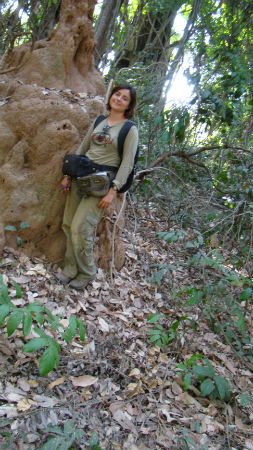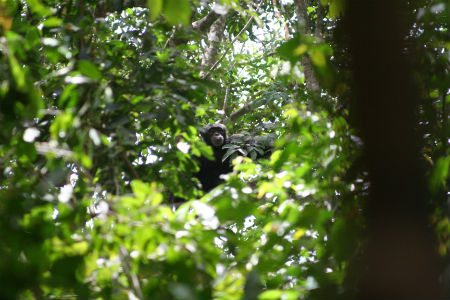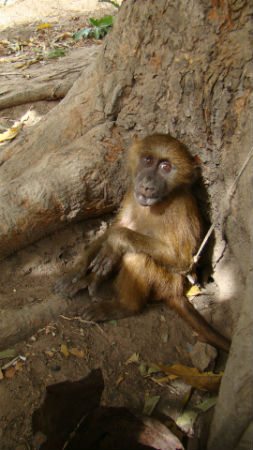Maria Joana Ferreira da Silva is the coordinator of a team of researchers in Portugal. Last year she was awarded a grant from Chester Zoo to support her work in protecting the endangered Guinea-Bissau Western chimpanzee. Below, she tells us more:

“Our team is investigating primate species in Guinea-Bissau to promote science-based conservation. Our ultimate goal is to protect the endangered Guinea-Bissau western chimpanzee, and other primate species at a landscape-scale in the long-term.
“Our main objectives are 1) to identify and select critical areas for primate conservation using a research-based system and 2) to engage local communities, national governmental agencies and local stakeholders in the protection of primates in Guinea-Bissau.
“To achieve our objectives, we will assess the current distribution and evaluate the conservation status of primate species in Guinea-Bissau and evaluate the intensity of deforestation and hunting in locations where primate populations remain. This will allow the developing of a landscape-level community-based conservation strategy.
“The endangered western chimpanzee (Pan troglodytes verus) is one of the more emblematic out of the ten species of primates found in Guinea-Bissau. Once erroneously declared extinct in the country, chimpanzees were re-discovered in the 90s and are currently heavily protected by local communities, national and international NGOs.
“They represent a major attraction for international ecotourism and are of particular importance for scientific research. The range of this sub-species extends further north and west than any other sub-species and so is considered key for the global conservation of the western chimpanzee. Additionally, chimpanzees in Cantanhez Forest National Park, the southernmost national park in Guinea-Bissau show a preference for constructing nests in palm trees. This is a particularity not seen in any other studied population in the world making these Guinea-Bissau chimpanzees unique.

“The western chimpanzees, as well as other primate species, are all under threat in Guinea-Bissau due to uncontrolled logging and hunting.
“Over the last five years, foreign logging and mining companies have deforested large areas of original habitat within the country at an alarming rate. At the beginning of 2014, deforestation went out of control. Over 100 container trucks en-route to China and filled with illegally logged timber from endangered tropical forest species were observed on a weekly basis near the capital international port.
“Deforestation has been responsible for the extinction of some populations already and most primates groups are likely to be confined to pockets of original habitat surrounded by areas profoundly altered by human activities. At least 1,500 primate carcasses are traded every dry season at the bush-meat markets in the capital city. The pet-trade is very profitable: an infant chimpanzee can reach £28-34 where most locals live with less than £2 a day.
“One day, I received a call from a villager who claimed to have seen a large group of baboons near his village. When I arrived, he showed me a baby male baboon, not older than two years old, tied up a tree. The baby baboon was terrified and shaking. When I lip-smacked (the baboon language for hello, I am your friend), he held up his arms, asking to be held.

“Around me, the children of the village were shouting that they had eaten the baboon’s mother the previous night. I immediately asked for water and food and tried to explain how the baboon’s living conditions could be improved. Despite my efforts, in the end of my explanations I could not remove the baby baboon from the village and I had to leave him there.
“There are no rescue centres for captive primates in the country and national governmental organizations have no financial and logistic means to transport primates to rescue centres in neighbouring countries. Communities are not informed of how unique these primate species are worldwide, what the dangers of eating primate meat are, what the impact of their hunting practices can be and that baby primates can never be good pets.
“Despite this conservation emergency, governmental agencies and national primate conservation NGOs are incapable of implementing concerted actions at a regional-level scale. Not only baseline information on the location of the last remaining populations is missing but also the regional conservation status is out-dated for most species. To implement effective conservation measures, a scientific-based method to define and prioritize the most important areas for primate conservation is needed.
“Chester Zoo’s support was essential to effectively launch our initiative and start the first phase of the project: a survey of primate groups in southern Guinea-Bissau. With the support of Chester Zoo, we were able to attract funding from other organizations promoting primate conservation in West Africa. Together, we can assure a future for the valuable and threatened primates of Guinea-Bissau.
“Fieldwork days in Guinea-Bissau can start well and become very dramatic without warning. When I returned home after the first stage of my fieldwork, I could not stop thinking about what I could do to help primate conservation in the country.”